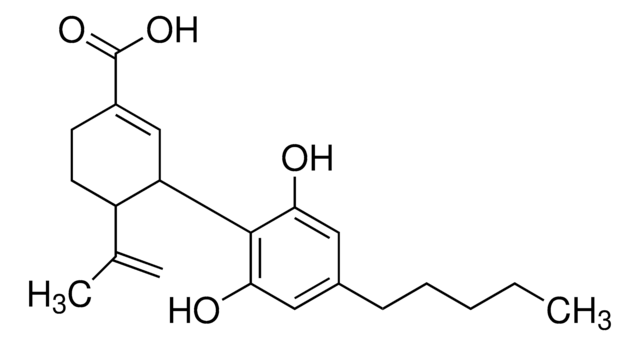C1909
Acide citrique monohydrate
ACS reagent, ≥99.0%
Synonyme(s) :
2-hydroxy-1,2,3-propanetricarboxylic acid monohydrate
About This Item
Produits recommandés
Qualité
ACS reagent
Niveau de qualité
Pureté
≥99.0%
Forme
powder
Impuretés
Substances carbonizable by hot sulfuric acid, passes test
≤0.005% Insoluble matter
Résidus de calcination
≤0.02%
pKa
(1) 3.13, (2) 4.76, (3) 6.4
Solubilité
H2O: soluble 54 % (w/w) at 10 °C (Citric acid in water)
H2O: 59.2 % (w/w) at 20 °C (Citric acid in water)
H2O: 84.0 % (w/w) at 100 °C (Citric acid in water)
Traces d'anions
chloride (Cl-): ≤0.001%
oxalate (C2O42-): passes test (limit about 0.05%)
phosphate (PO43-): ≤0.001%
sulfate (SO42-): ≤0.002%
Traces de cations
Fe: ≤3 ppm
Pb: ≤2 ppm
Chaîne SMILES
OC(CC(O)(C(O)=O)CC(O)=O)=O.O
InChI
1S/C6H8O7.H2O/c7-3(8)1-6(13,5(11)12)2-4(9)10;/h13H,1-2H2,(H,7,8)(H,9,10)(H,11,12);1H2
Clé InChI
YASYEJJMZJALEJ-UHFFFAOYSA-N
Vous recherchez des produits similaires ? Visite Guide de comparaison des produits
Catégories apparentées
Description générale
Citric acid monohydrate is an organic weak acid used as a natural preservative in food and beverage products.
Application
It may be used:
- As release-modifying agent to improve the release of diltiazem hydrochloride from melt extruded Eudragit RS PO tablets.
- To prepare citrate buffer for use in the preparation of platelets for intravital microscopy.
- To prepare Tris-citrate buffer employed for the electrophoresis of bacterial enzymes.
Mention d'avertissement
Warning
Mentions de danger
Conseils de prudence
Classification des risques
Eye Irrit. 2 - STOT SE 3
Organes cibles
Respiratory system
Code de la classe de stockage
11 - Combustible Solids
Classe de danger pour l'eau (WGK)
WGK 1
Point d'éclair (°F)
345.0 °F - closed cup
Point d'éclair (°C)
173.9 °C - closed cup
Équipement de protection individuelle
dust mask type N95 (US), Eyeshields, Gloves
Faites votre choix parmi les versions les plus récentes :
Déjà en possession de ce produit ?
Retrouvez la documentation relative aux produits que vous avez récemment achetés dans la Bibliothèque de documents.
Les clients ont également consulté
Notre équipe de scientifiques dispose d'une expérience dans tous les secteurs de la recherche, notamment en sciences de la vie, science des matériaux, synthèse chimique, chromatographie, analyse et dans de nombreux autres domaines..
Contacter notre Service technique




